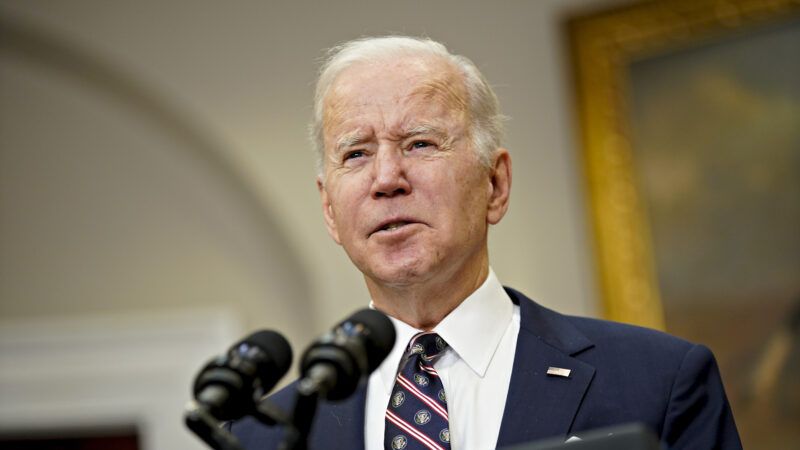Biden Defends the Military's 'Preparation and Precision' in a Counterterrorism Operation That Killed Syrian Kids
Multiple children died in the raid, but so did the leader of ISIS—which makes the operation “successful” in the Pentagon’s book.

President Joe Biden announced today that a U.S. raid in northwestern Syria killed top Islamic State leader Abu Ibrahim al-Hashimi al-Qurayshi. Al-Qurayshi became the leader of the Islamic State after the death of Abu Bakr al-Baghdadi, who was killed in a similar 2019 raid led by U.S. Special Operations forces.
"Last night at my direction, U.S. military forces in northwest Syria successfully undertook a counterterrorism operation to protect the American people and our Allies, and make the world a safer place," Biden said in a statement. In Thursday morning remarks on the raid, he praised the "signature preparation and precision" U.S. troops employed in carrying out the attack, and noted that he "directed the Department of Defense to take every precaution possible to minimize civilian casualties."
Lost in that framing, however, is the civilian death toll. Syrian defense group the White Helmets reported that at least 13 people were killed during the operation, including six children and four women. "In the planning process, the U.S. military was very concerned about the family living on the first floor," reported CBS News. "Before the operation started, troops called out for civilians to leave the building."
It must be said that civilians died at the hands of al-Qurayshi, who detonated a bomb at the beginning of the operation. Biden notes that al-Qurayshi "had chosen to surround himself with families, including children." There is no getting around the fact that he and his group stand for, and have done, terrible things.
But the Pentagon has called this operation "successful," and Biden, though he spent ample time chastising al-Qurayshi for his role in the civilian deaths, did not express regret for them himself.
Since the beginning of the year, the U.S. has shown questionable regard for civilians and children in its military operations in the Middle East. U.S. forces launched airstrikes against a prison holding Islamic State fighters in late January, despite nearly 700 children being detained there. "It is unclear how many of the detained boys had been fighters and how many were in detention simply because they were deemed too old to be in camps for ISIS families," reported The New York Times. Teenage inmates were among the nearly 500 people ultimately killed as Syrian Democratic Forces and U.S. forces fought to regain control of the prison.
January also saw numerous reports of past attacks that are now receiving increased scrutiny. During previous campaigns against the Islamic State, the U.S. military placed the ISIS-controlled Tabqa Dam, the largest dam in Syria, on a no-strike list. A U.S. Special Operations unit bombed it in 2017 anyway—despite a military report that warned against an attack, saying the ensuing flood could "kill tens of thousands of civilians." Conduct in Afghanistan came under fire in January as well. The New York Times published footage of an August 29 U.S. military strike in Kabul that killed 10 civilians (including seven children), clearly showing that children were in the vicinity prior to the attack.
One day after the Times released footage from Kabul, congressional Democrats sent a letter to Biden condemning "repeated civilian casualties arising from secretive and unaccountable lethal operations." Defense Secretary Lloyd Austin issued a directive just one week later, calling on the military to "improve upon efforts to protect civilians."
Indeed, Biden alluded to this rising concern as he discussed Thursday's attack. "We made this choice to minimize civilian casualties," Biden said of the decision to carry out a raid rather than an airstrike. That may be true, but inflicting civilian casualties and nonetheless praising the precision of the attack is simply callous.
There is still a question mark lingering over U.S. military engagement in Syria and how much longer our operations will be necessary—an issue that Biden did not address in his remarks. Former President Barack Obama said back in 2014 that the campaign against ISIS would "be a long-term campaign. There are not quick fixes involved." But given the current state of the fight, it is unclear why we remain involved eight years later.
Even in the group's early years, ISIS did not pose an existential threat to the U.S.; it certainly doesn't now. The group was effectively defeated years ago and has not held territory in Iraq or Syria since 2019. Still, roughly 900 U.S. troops are currently stationed in Syria and are tasked with fighting ISIS. The Biden administration says it's unlikely to withdraw them anytime soon (despite there being no congressional authorization for this presence). For as long as they're stationed there, they'll face attacks from militias that want them to leave.
America's involvement in Syria carries dangers to civilians and U.S. troops alike, and our military departure is long overdue. An ISIS leader was killed today, but U.S. officials should not minimize the civilian casualties that accompanied his death. Unless they concede that we can and should do more to reduce harm, civilians will continue to suffer.


Show Comments (76)